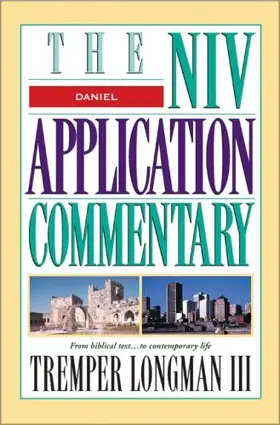

Daniel
Pages
320
Publisher
Zondervan
Published
1/1/1999
ISBN-13
9780310206088
Collections
This book appears in the following featured collections.
- Favorite Commentaries for Personal Study by Jeremy Pierce (parableman)
- Essential OT Commentaries for a Preacher's Library by Derek W. H. Thomas
- Building an OT Commentary Library by Invitation to Biblical Interpretation (Kostenberger & Patterson)
- TGC: Preaching Commentaries by The Gospel Coalition
Reviews
Longman explores the original meaning and contemporary significance of this interesting, yet often-enigmatic, biblical book. He explains his move from the ancient text to our modern situation: “Daniel becomes, in the first six chapters, a study of how a person of faith not only copes but even thrives in a hostile cultural setting. In the last half of the book, it raises the question of how we are to understand the apocalyptic sections of Scripture that describe the end of history. The theme of the whole book is that in spite of present difficult circumstances, God is in control and will defeat the forces of evil and oppression.”
[Full Review]
I typically really enjoy Longman's works but I found his Daniel commentary to be lamentably brief concerning some of the more difficult passages. The NIVAC doesn't excel in an in-depth exegetical analysis (intentionally so), and it definitely seems to hurt this particular installment in the series. Overall, Longman provides a good defense for an early date and and adequately covers the text, but neglects an in-depth look required by some harder passages.
Longman defends an older, 6th century date of composition (contra Goldingay). I am inclined to side with Goldingay. Longman, writing after Goldingay, interacts frequently with Goldingay, disagreeing, but doing so with considerable respect, and even admiration. Longman is not at all dogmatic in his insistence on a 6th century dating, but does feel it necessary because of his understanding of the genre of Daniel, and written to predict events well in advance. But if Daniel's latter chapters are taken as apocalyptic interpretation of events in process during the time of composition, things look very different. Longman is an accomplished scholar. He takes a stand and sticks to it. I can respect that. His exegesis is consistent, and, as is the goal of NIVAC, makes the text more easily preached. Having both Goldingay and Longman (and hopefully we'll see Wooden's volume soon) together is probably a healthy combo.
Longman has written a long list of commentaries and also maintains a very helpful Old Testament Commentary Survey. His contribution to the NIVAC comes with many recommendations. Mathison commends it with these words: “Longman’s commentary on Daniel is an example of one of the better works in the series. Longman’s strength is in his literary analysis, and this is a strength of this commentary. Highly recommended.”
[Full Review]
After you leave the woods of the academic commentaries on Daniel, there isn't a lot to recommend in my opinion (granted I have not seen Duguid's commentary). However, for a lay audience, Longman's commentary stands out. Obviously you're not going to get anywhere near the detail of Collins or Goldingay in an NIV Application volume, but the 'Original Meaning' section is beefy for a volume in this series. Longman isn't afraid to discuss ANE background, and he appropriately simplifies it for a lay audience. You don't find much original research here. Rather it serves as a handy, accessible guide drawing upon the best of current studies on Daniel. Longman does opt for a sixth century date, but is sympathetic towards late daters like Goldingay. This commentary was conservative without being polemical. The applications were often helpful and I never found them to be cliched. With that said I often found myself wanting to go in slightly different directions in my own teaching. This is my commentary of choice for lay students and also should be consulted for those teaching in a church setting.
[Full Review]
The NIVAC commentaries are hit and miss. Some are very helpful, while others overemphasize one or another feature of the series to the neglect of the others. Longman's commentary on Daniel is an example of one of the better works in the series. Longman's strength is in his literary analysis, and this is a strength of this commentary. Highly recommended.
[Full Review]
6th century date.
Helpful exposition and thoughtful theological reflections and applications from a Reformed perspective. Evangelical.
[Full Review]







